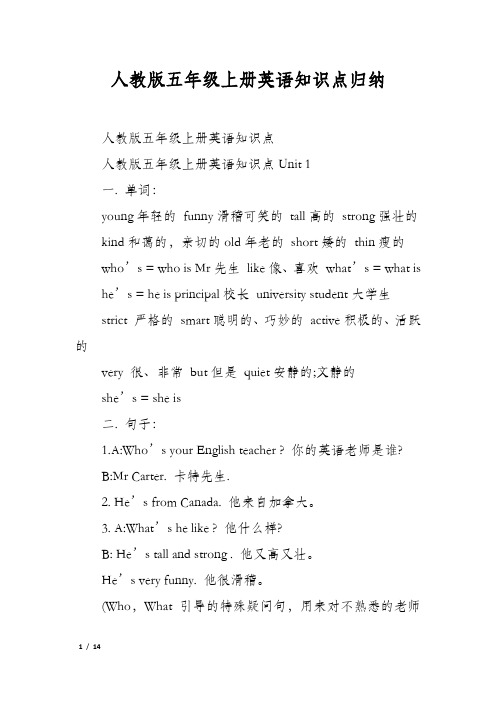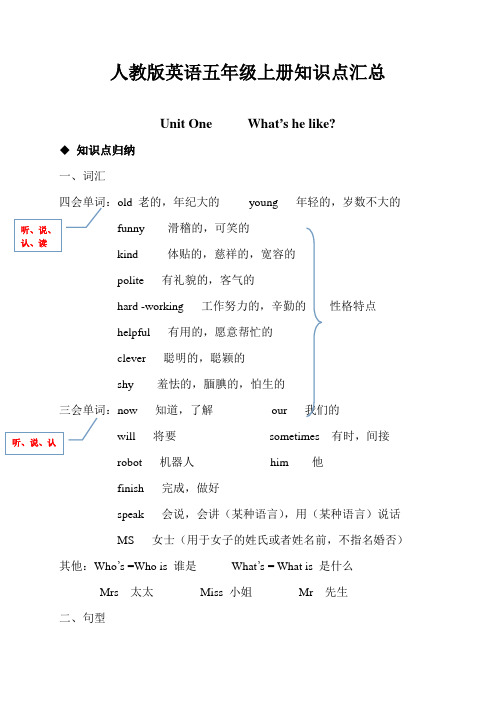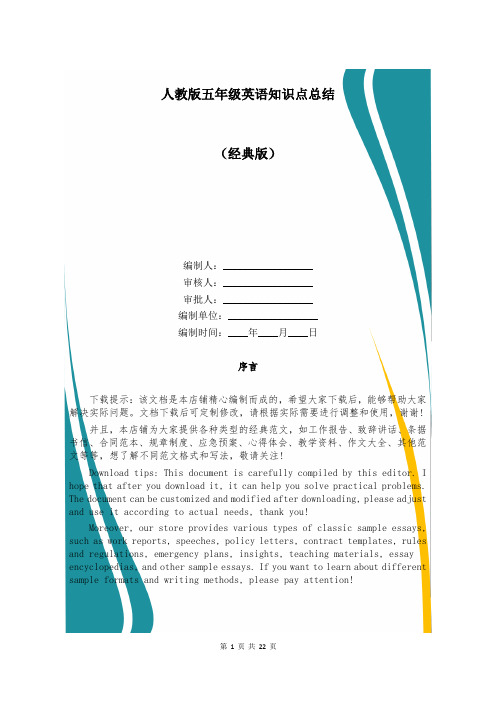人教版五年级英语上册知识点归纳
人教版五年级上册英语知识点归纳

人教版五年级上册英语知识点归纳人教版五年级上册英语知识点人教版五年级上册英语知识点Unit 1一. 单词:young年轻的funny滑稽可笑的tall高的strong强壮的kind和蔼的,亲切的old年老的short矮的thin瘦的who’s = who is Mr先生like像、喜欢what’s = what is he’s = he is principal校长university student大学生strict 严格的smart聪明的、巧妙的active积极的、活跃的very 很、非常but但是quiet安静的;文静的she’s = she is二. 句子:1.A:Who’s your English teacher ? 你的英语老师是谁?B:Mr Carter. 卡特先生.2. He’s from Canada. 他来自加拿大。
3. A:What’s he like ? 他什么样?B: He’s tall and strong . 他又高又壮。
He’s very funny. 他很滑稽。
(Who,What引导的特殊疑问句,用来对不熟悉的老师进行问答:Whos + 某人?Whats he / she like? He / She is + 与身体特征和性格特征有关的形容词。
)4.A: Who’s that young lady/? 那个年轻的女士是谁?B:She’s our principal. 她是我们的校长。
5.I have a new math teacher. 我有一位新数学老师。
6.Her class is so much fun. 她的课非常有趣。
7.She’s a university student. 她是一名大学生。
8. A: Is she quiet ? 她很安静吗?B: No, she isn’t. She’s very active. 不是的。
她很活跃的。
( Is引导的一般疑问句,谈论某位老师是否具有某方面的特征:Is he / she + 与身体特征和性格特征有关的形容词,回答用:Yes, he / she is. No, he / she isnt. )9. A:Is she strict ? 她很严格么?B:Yes, she is , but she’s very kind . 是的,但她很和蔼的。
人教版五年级英语上册知识点汇总

精品基础教育教学资料,仅供参考,需要可下载使用!人教版五年级英语上册知识点汇总第一单元需要掌握的单词:young年轻的funny滑稽可笑的tall高的strong强壮的kind和蔼的old年老的short矮的thin瘦的Mr先生like像;喜欢strict严格的smart聪明的;巧妙的active积极的;活跃的quiet安静的;very很;非常but但是缩写形式:who’s=who is what’s=what is he’s=he is she’s=she is重要句型:1.Who’s your art teacher?你们的美术老师是谁?----Mr Hu.胡先生.2.What’s he like?他长得什么样子? ----He’s short and thin.他又矮又瘦3.Is she young?她年轻吗?----Yes,she is/No, she isn’t.以前的知识:I have a new math teacher.我有一个新数学老师.(小学三年级已经学过I havea pen.)注意: 划线部分可以替换.第二单元:四会单词:Monday 星期一 Tuesday星期二Wednesday星期三 Thursday星期四Friday 星期五Saturday星期六Sunday 星期日day天;日子have有;吃on 在……时候too也;太短语:do homework 做作业watch TV 看电视read books 读书What about? ......怎么样?do housework 做家务play computer games 玩电脑游戏重点句型:1.What day is it today?今天星期几?—It’s Monday.星期一.2. What do we have on Mondays?星期一我们有什么课?—We have English,science,computer and P.E.我们有英语课,科学,计算机跟体育课.3.What do you do on Saturdays?星期六你干什么?(具体的某一天前用介词on,在具体的时间前,用介词at)—I often do my homework.我通常做家庭作业.4.What about you?你呢?—I do my homework,too.我也是做家庭作业.第三单元:四会单词:eggplant 茄子fish 鱼green beans 青豆tofu 豆腐potato 土豆tomato 西红柿for 为;给lunch 中餐;午饭we 我们tasty 好吃的;可口的sweet 甜的sour 酸的fresh 新鲜的salty 咸的favourite 最喜爱的;特别喜爱的fruit 水果grape 葡萄缩写形式:they’re=they are don’t=do not重点句型:1.What would you like for lunch?你午餐想吃什么?-----I’d like some tomatoes and mutton.我想吃一些西红柿跟羊肉.2.What’s your favourite fruit?你最喜欢的水果是什么?------/I like apples.我喜欢苹果.3.I don’t like grapes.我不喜欢葡萄.4.Bananas are my favourite.我最喜欢香蕉.第四单元一. 单词:empty the trash倒垃圾cook the meals 做饭water the flowers浇花sweep the floor扫地clean the bedroom打扫卧室make the bed铺床set the table摆餐具wash the clothes洗衣服do the dishes洗碗碟put away the clothes收拾衣服can’t = cannot(不会;不能)use a computer(使用计算机)二. 句子:1. I’m helpful! I can sweep the floor。
五年级英语上册知识点总结

人教版英语五年级上册知识点汇总Unit One What ’s he like?知识点归纳 一、词汇四会单词:old 老的,年纪大的 young 年轻的,岁数不大的funny 滑稽的,可笑的 kind 体贴的,慈祥的,宽容的 polite 有礼貌的,客气的hard -working 工作努力的,辛勤的 性格特点 helpful 有用的,愿意帮忙的 clever 聪明的,聪颖的 shy 羞怯的,腼腆的,怕生的三会单词:now 知道,了解 our 我们的will 将要 sometimes 有时,间接 robot 机器人 him 他 finish 完成,做好speak 会说,会讲(某种语言),用(某种语言)说话 MS 女士(用于女子的姓氏或者姓名前,不指名婚否)其他:Who ’s =Who is 谁是 What ’s = What is 是什么 Mrs 太太 Miss 小姐 Mr 先生 二、句型1、询问人art 美术English 英语music 音乐——Who’s your maths 数学teacher?谁是你们的science 科学老师?PE 体育Chinese 语文——Mr Jones. 琼斯先生/ Miss Green. 格林小姐2、询问人的外貌特征/性格特点——What’s he/she like? 他/她这个人怎么样?——He/She is kind/ strict/old/tall…….3、——Is he/she young? 他/她年轻吗?——Yes,he /she is. 是的,他/她年轻。
No,he/she isn’t. 不,他/她不年轻。
4、以Do you 开头的句子的回答——Do you know Mr Young?——Yes,I do. 是的,我知道。
(肯定回答)No,I don’t. 不,我不知道。
(否定回答)5、Ms Wang will be our new Chinese teacher.王老师将成为我们的新语文老师。
人教版五年级英语知识点总结

人教版五年级英语知识点总结(经典版)编制人:__________________审核人:__________________审批人:__________________编制单位:__________________编制时间:____年____月____日序言下载提示:该文档是本店铺精心编制而成的,希望大家下载后,能够帮助大家解决实际问题。
文档下载后可定制修改,请根据实际需要进行调整和使用,谢谢!并且,本店铺为大家提供各种类型的经典范文,如工作报告、致辞讲话、条据书信、合同范本、规章制度、应急预案、心得体会、教学资料、作文大全、其他范文等等,想了解不同范文格式和写法,敬请关注!Download tips: This document is carefully compiled by this editor. I hope that after you download it, it can help you solve practical problems. The document can be customized and modified after downloading, please adjust and use it according to actual needs, thank you!Moreover, our store provides various types of classic sample essays, such as work reports, speeches, policy letters, contract templates, rules and regulations, emergency plans, insights, teaching materials, essay encyclopedias, and other sample essays. If you want to learn about different sample formats and writing methods, please pay attention!人教版五年级英语知识点总结学习是没有尽头的,只有在不断的学习中才能提高自己,那么关于五年级英语知识点有哪些呢?以下是本店铺准备的一些人教版五年级英语知识点,仅供参考。
(完整版)人教版五年级上册英语知识点总结

五年级上册知识点总结Unit 1重点单词old 老的,年纪大的young 年轻的,岁数不大的funny 滑稽的,可笑的kind 体贴的,慈祥的,宽容的strict 要求严格的,严厉的polite 有礼貌的,客气的shy 羞怯的,腼腆的,怕生的helpful 有用的,愿意帮忙的clever 聪明的,聪颖的hard-working工作努力的,辛勤的music 音乐art 美术science 科学English 英语maths/math 数学Chinese 语文,中文sometimes 有时,间或robot 机器人speak 会说,会讲(某种语言);用(某种语言)说话重点句子1. —Who’s your art teacher? 谁是你的美术老师?—Mr. Jones.琼斯老师。
2. —Is he young? 他年轻吗?—Yes, he is. 是的,他年轻。
—No, he isn’t. 不,他不年轻。
3. —What’s Wu Yifan like? 吴一帆怎样?—He’s hard-working. 他很勤奋。
4. Ms Wang will be our new Chinese teacher. 王老师会成为我们的新语文老师。
5. He is very helpful at home. 他在家很能干。
6. Robin is short but strong. 罗宾个子矮,但是身体强壮。
7. He can speak Chinese and English. 他会说中文和英语。
8. He makes me finish my homework. 他让我写作业。
语音字母y在单词中的发音:1、双音节或多音节词末发[ i ]。
bab y happ y wind y sunn y sorr y cand y man y famil y part y 婴儿开心的有风的晴朗的对不起糖果许多家庭聚会课外补充:2、y 在单音节词末发[ ai ]例:b y乘坐m y我的wh y为什么cr y哭fl y 飞重点知识及语法1 、询问他人的外貌或性格:-What’s he/she like? - He/She is kind/…2 、一般疑问句的问与答::—Is he/she…?—Yes, he/she is. —No, he/she isn’t.—Do you know…? —Yes, I do. —No, I don’t3 、be动词的三种形式am, is, are与人称代词连用的用法:I + am,He, she, it ,人名、物名+ isWe, you, they + are4 、Ms., Miss, Mr., Mrs.的区别:Ms. [miz](缩略词)(用于女子的姓氏或姓名前,不指明婚否)女士;Miss [mis](用于未婚女子的姓氏或姓名前,以示礼貌)小姐,女士;Mr. [mist ](mister 的缩略词)(用于男子的姓氏或姓名前)先生;Mrs. [misiz](用于已婚女子的姓氏或姓名前)太太;夫人。
人教版五年级英语上册知识点总结

人教版五年级英语上册知识点总结
1. 词汇和读音(Vocabulary and Pronunciation)- 研究新单词的拼写和发音
- 研究可以用于不同场景的常用词汇
2. 语法和句型(Grammar and Sentence Patterns)- 研究基本的英语语法规则
- 研究常见的句型结构如肯定句、否定句、疑问句等
- 研究时态的用法,如一般现在时、一般过去时等
3. 听力和口语(Listening and Speaking)
- 提高对英语的听力理解能力
- 研究正确的发音和口语表达方式
- 练进行简单的日常对话和交流
4. 阅读和写作(Reading and Writing)
- 多读英语文章,提高阅读理解能力
- 研究书写正确的英文句子和段落
- 练书写简单的英语作文
5. 文化和背景知识(Culture and Background Knowledge)
- 了解英语国家的文化、风俗和惯
- 研究英语国家的历史和地理知识
- 掌握一些关于英语国家的常识
6. 课文内容(Textbook Content)
- 复课本中的重点内容和例句
- 理解课文中的意思和故事情节
- 运用课文中的词汇和句型进行练和巩固
以上是人教版五年级英语上册知识点的总结。
通过对这些知识点的研究和掌握,你将能够提高英语听说读写的能力,并且更好地理解英语国家的文化和背景知识。
人教精通版五年级英语上册各单元知识点汇总

人教精通版五年级英语上册各单元知识点汇总Unit 1 We have new friends.单元知识必备清单重点词汇hello 喂;嗨(招呼用语)am 是I’m=I amwhere 哪里are 是you 你;你们from 从what 什么is 是your 你的;你们的name 名字what’s=what is Britain 英国Australia 澳大利亚New Zealand 新西兰France 法国Germany 德国Russia 俄罗斯city 城市road 道路street 街道重点短语come here 到这里来come from 来自welcome to... 欢迎来到……重点句型1. I’m Bob. I’m eleven. 我是鲍勃。
我11 岁。
解读:在向别人进行自我介绍时,常用“I’m...”句型表示“我是……”。
该句型主要用于介绍自己的名字、年龄、身材等。
2. —Where are you from? 你来自哪里?—I’m from France. 我来自法国。
解读:问句是由where 引导的特殊疑问句,用来询问某人来自哪里。
句型结构:—Where + be 动词+ 主语+ from? —主语+ be动词+ from + 地点名词。
同义句:—Where do you come from? 你来自哪里?—I come from Germany. 我来自德国。
本句也是询问某人来自哪里,句中有实义动词come, 因此必须借助助动词do 的相应形式来构成问句。
3.—What’s your name?你的名字是什么?—My name is Cathy.我的名字是凯茜。
解读:本句用来询问对方的姓名。
what’s 是what is 的缩写形式。
my 和your 是形容词性物主代词。
句型结构::—What’s your name? —My name is + 名字/ I’m + 名字.4. —Where do you live, Cathy?你住在哪里,凯茜?—I live in the Happy City. 我住在幸福城。
人教版五年级上册英语知识点汇总

人教版五年级上册英语知识点汇总一、词汇1. 日常生活词汇•家庭生活相关词汇(如housework, chores, cleaning, cooking等)•饮食习惯与健康(如healthy, unhealthy, fruit, vegetable, junk food等)•购物与交易(如shop, market, buy, sell, price等)2. 学校与学习•学习态度与方法(如study hard, careful, practice, revise等)•学科词汇扩展(如physics, geography, history等)•学校活动与规则(如rules, library rules, school trip, sports day等)3. 自然与环境•天气与自然现象(如cloudy, foggy, thunder, lightning等)•动物与植物世界(如wild animals, rainforest, plant, tree species等)4. 情感与社交•情感表达词汇(如happy, sad, angry, excited, surprised等)•社交技能与礼仪(如invite, thank, apologize, polite, impolite等)二、语法1. 现在进行时复习与深入•巩固现在进行时的基本用法,进一步学习在不同语境中的应用。
2. 一般过去时•学习并掌握一般过去时的基本结构和用法,用于描述过去发生的动作或状态。
•句型:主语+ 动词过去式+ 其他成分3. 情态动词的初步接触•学习几个基本的情态动词(如can, could, may, might, should, must等)的基本用法和区别。
4. 简单的形容词比较级和最高级复习•复习并巩固形容词比较级和最高级的用法,注意规则变化与不规则变化。
三、句型与对话•能够围绕日常生活、学校生活、兴趣爱好等话题进行流畅的对话和交流。
- 1、下载文档前请自行甄别文档内容的完整性,平台不提供额外的编辑、内容补充、找答案等附加服务。
- 2、"仅部分预览"的文档,不可在线预览部分如存在完整性等问题,可反馈申请退款(可完整预览的文档不适用该条件!)。
- 3、如文档侵犯您的权益,请联系客服反馈,我们会尽快为您处理(人工客服工作时间:9:00-18:30)。
Unit4 What can you do?Part A一、重点单词sing唱,唱歌dance跳舞draw pictures 画画draw cartoons 画漫画sing English songs 唱英文歌曲I can sing an English songclean the classroom 打扫教室do some kung fu 练武术(kung fu,音译词,功夫;erhu,tofu,pipa)play the pipa 弹琵琶二、课文导入Miss white:【1】We’ll have an English party next Tuesday!What can you do for the party,children?Zhang Peng:I 【2】can sing English songs.Miss white:【3】Wonderful! 【4】How about you, John?John: I can do some kung fu!Miss white:Thank you, John.1、we’ll = we will,will表示“将要”的意思,在这句话中充当助动词,修饰句子的时态,表达一种将来的意思,will+动词原形+其他I will have an English class 我将会有一节英语课She will go to the KFC to eat her favorite hamburger她将会去kfc吃她最喜欢的汉堡包2、can,情态动词,表示“可以”的意思,即具有做某事的能力,can+动词原形+其他You can sing English song 你会唱英文歌She can play the pipa 她会弹琵琶注意:will和can 都没有人称和数的变化【拓展】只要句子里面有can、will等词语,那么将句子改为疑问句,都是将can、will提到主语前面即可——Will you have an English class?——Will she go to the KFC to eat her favorite Hamburger?——Can I sing English song?——Can she play the pipa?练一练:(1). I will play football with my friend on Saturday____________________________________(2). She will draw some pictures for her mother as birthday gift____________________________________(3). Mike can do kung fu________________(4). She can sing many Chinese songs__________________________3、赞美用语wonderful!Wonderful 的意思为“好极了!太棒了!”它常用在口语中,用来表达赞美之情—Mom,I can sing and dance—Wonderful!4、how about you?你呢?How about you = what about you?它们的意思都是“你呢?”“......怎么样?”,常常用于引出话题后,询问别人的情况怎样。
在这里“how about you,John?”是怀特老师问完张鹏的特长后,又问约翰有没有什么特长,这样避免了语式的重复——I can play ping-pong, how about you?——I can play basketball三、重点句型—What can you do for the party,children?—I can sing English songs.提问:What can + 主语+do...? (......会做什么?)回答:主语+can+动词原形+其它.(......会......)—What can you do?你会做什么?—I can do kung fu 我会打功夫—What can she do?她会做什么?—She can dance?她会跳舞—What can you do?你会做什么?—I can cook delicious food 我会煮美味的食物练一练:1.麦特(Mike)会做什么?他会打功夫___________________ / _________________2.你会做什么?我会弹琵琶___________________ / _________________3.她会做什么?她会唱英文歌___________________ / _________________4.他会做什么?他会画画___________________ / _________________四、oo在单词中的发音[ u ] 和[ u: ]1、[ u ] 短元音。
嘴巴张开略向前突出,嘴型稍微收圆并放松些,舌头后缩例如:book书cook 烹饪look 看 good 好的wood 木头foot 脚助记口诀:1. 看look好good书book,砍柴wood做饭cook洗脚foot 2、[ u: ] 长元音。
嘴型小而圆,微微外突,舌头尽量后缩。
例如:balloon 气球 food 食物 zoo 动物园 noodles 面条当堂练习一、根据画线部分读音相同的规律将下列单词进行分类。
zoo, feet, good, sunny, meet, window, look,cow, snow, down, windy, noodles1. too ________________2. book ________________3. yellow __________4. sorry _________________5. see ___________________6. flower ___________________二、看图,写词组______________________ _________________________ _____________________ ______________________ _________________________三、单项选择()1. Can you play _______piano? ——Yes, I can.A. /B. theC. a()2. What can you do? ——I _______ sing English songs.A. doB. amC. can()3. What can you do _____ the party?A. forB. onC. at()4. I can do_____ kung fu.A. aB. anyC. some()5. Can you sing English songs? ——No, ___________.A. I do.B. I can.C. I can’t.()6. I can’t play _________ basketball.A. aB. theC. /()7.当你想问对方“你会做什么”时,你说:_____________.A. What can you do?B. What do you do?C. What will you do? ()8.当你想告诉对方“我会画卡通画”时,你说:_________.A. I can speak English.B. I can sing English songs.C. I can draw cartoons.()9.当你想问对方“你会不会弹琵琶”时,你说:__________.A. What can you do?B. Can you play the pipa?C. Can you play the piano?()10.当你想告诉对方“下周二我们将会进行英语派对”时,你说:________________________.A. We will have an English party next Tuesday.B. We have an English party on Tuesday.C. We will have a party next Tuesday.四、排列下列句子,使之成为一段通顺的对话()A. What can you do?()B. Great! Can you use a computer?()C. I can play the pipa.()D. Yes, I can.Who draw Can do for1. What can you do the English party?2. I can some kung fu.3. you clean the classroom?4. Mike can pictures.5. ——can dance?——Wu Yifan can.六、按要求完成下列句子1. Can you do any kung fu? (做否定回答)__________________________________________________2.What can you do, Chen Jie? (用英语回答:我会打篮球)_____________________________________________________3.Sarah, cook, can’t (.) (连词成句) ——————————————————————————4.Robot can speak English. (英译汉)____________________________________________________5.Can you play basketball? (用肯定回答)_____________________________________________________七、阅读短文,判断正(T)误(F)Hello, boys and girls. I ‘m a robot. My name is Robin. I’m not tall but I’m clever. I’m your good friend. I can see with my eyes. I can hear with my ears. I can speak English and Chinese. I can sing English songs for you. I can cook for you. I can clean the room for you. I can do some kung fu, but I can’t swim. I can’t play basketball. Would you like to be my friend?( ) 1. Robin can cook.( ) 2. Robin is clever but he isn’t tall.( ) 3. Robin can’t speak English.( ) 4. Robin can speak Chinese.( ) 5. Robin can’t do any kung fu.Part B一、重点单词swim 游泳cook烹饪play basketball打篮球play ping-pong打乒乓球speak English说英语二、课文导入Mr Ma:Good afternoon,children. Today we‘’ll learn some kung fu Children:Cool!Mr Ma:Can you do any kung fu【1】,John?John:Yes,I canMr Ma:Can you do any【2】kung fu,Oliver?Oliver:No,I can’t.Mr Ma: No problem【3】. I can help you.1、确认对方能力用Can you......?我们想确认对方的能力时,通常用下面的句型:提问:Can 主语(you)+ 动词原形+ 其他?回答:肯定回答Yes,主语(I)can否定回答No,主语(I)can’t例如:——Can you swim?你会游泳吗?——Yes,I can 是的,我会/ No, I can’t 不,我不会——Can she speak English?她会说英语吗——Yes, she can 是的,她会/ No, she can’t 不,她不会练一练:(1)你的妈妈会烹饪吗?/ 是的,她会______________________________(2)你会打乒乓球吗?/ 不,我不会____________________________(3)麦特会打篮球吗?/ 是的,他会____________________________2、any, any 意为“任何的,任一的”,和some“一些”一样,其后可以接可数名词,也可以接不可数名词。
